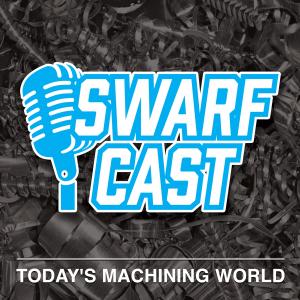Swarfcast

How to Find the Right Asian Supplier, with Jennifer Grant—EP. 152
Our guest on the podcast today is Jennifer Grant, marketing manager for Haizol Global Europe.
Haizol is a company that connects manufacturing companies in plastics and metal working with suppliers in Asia, most often China. The company’s value proposition is that it bypasses daunting challenges inherent when outsourcing to foreign countries, such as vetting suppliers and communicating in a foreign language.
Haizol has to two separate Web platforms, haizolglobal.com and haizol.com.
Scroll down to read more and listen to the podcast. Or listen on your phone with Google Podcasts, Apple Podcasts, Spotify, or your favorite app.
Find us on Social:
Facebook: https://www.facebook.com/swarfcast
Instagram: https://www.instagram.com/swarfcast/
LinkedIn: https://www.linkedin.com/company/todays-machining-world/
Twitter: https://twitter.com/tmwswarfblog
Main Points
Haizol.com
Haizol.com is a matchmaking service, connecting buyers in Western countries with suppliers in Asia. Buyers log on to haizol.com where they can submit part drawings and receive quotes from available suppliers. They narrow down choices of suppliers using filters for characteristics such as certifications, location, capacity, number of employees, and R&D departments. Haizol.com assists with negotiation and communication between the companies, but the buyers and suppliers have autonomous relationships.
Haizolglobal.com
Rather than acting as a matchmaker, Haizol Global serves buyers directly. It has its own manufacturing capacity and sometimes outsources work to some preferred manufacturers. The advantage of Haizol Global over haizol.com is that buyers receive constant customer support with an English speaking account manager who works with them throughout the production process. Haizol Global has a portal which gives buyers realtime information throughout the process. Account managers are available to answer buyers’ questions.
Buyers submit their drawings on Haizol Global’s website. Engineers look at the design and decide which of its shops should produce the part. A sample part is produced, which buyers then must approve. Then full scale production begins. Buyers don’t have the burden of having to choose between different suppliers. Haizol Global takes on the responsibility to deliver the part to the expectation of the buyers. Buyers don’t have to spend resources coordinating with Asian suppliers or performing regular quality checks.
Haizol Global’s customers are able to visit the shops making their parts, though Jennifer says very few companies have made the trip in the last few years during the pandemic. Usually the customers who travel to the factories in Asia are doing larger part runs, rather than single prototype jobs.
Jennifer says some clients want constant updates during production, while others are satisfied just waiting for the finished parts to arrive. Haizol Global guarantees parts will arrive at the promised time, baring unforeseen circumstances like worldwide pandemics.
Nondisclosure Agreements
Before buyers upload part prints to either Haizol Global or haizol.com, they can upload NDAs online. I questioned Jennifer about the risks of sending proprietary drawings to Chinese companies, notorious for stealing intellectual property. She argues that though that is a risk, Haizol has vetted the factories it works with, meaning it would be less risky working with Haizol than with a company found in Asia through a less established channel. Haizol has been working with the same factories for years and weeds out the ones who produce inferior work.

Jennifer Grant of Haizol Global Europe
Language
Jennifer says the language barrier is one of the biggest hurdles preventing companies from outsourcing overseas. Even small misunderstandings from language discrepancies can cause huge problems, which is why a company like Haizol is so attractive for Western buyers.
The majority of the manufacturing for haizol.com and Haizol Global takes place in China, but it also uses shops in Vietnam and the Philippines, which is advantageous in case of a problem with the supply chain in one country.
Effects of Reshoring
Haizol Global has a lot of customers in Western Europe, but most customers are located in the United States.
Jennifer says Haizol has not seen a recent reduction in users, despite current trends of bringing back manufacturing work to North America. She says that using Haizol helps prevent some of the supply chain issues that have given outsourcing to China such a bad reputation.
She says that the quality of manufacturing in China is significantly better than it was a decade ago. China’s Made in China 2025 initiative passed in 2015 has improved its manufacturing standards. Also, as more Western countries continue to outsource to China manufacturing abilities have improved.
Haizol’s Female Founder and CEO
Haizol’s CEO, Sherry She, founded the company. Jennifer says female CEOs are quite uncommon in China, but it is becoming more normal to find women in leadership positions at large companies.
Jennifer’s Story of Living In China
Jennifer moved to China in 2013 and spent most of her 20s living in Shanghai. Before starting at Haizol four years ago, she worked for a different Chinese firm, also in the manufacturing sector. She says she loved living in China, but decided to return to London at the end of 2020. She lived in China for the first year of the COVID-19 pandemic when the world still believed it would not spread to the rest of the globe. If you listen to the interview, you can hear details about what it was like to be “locked down” in China. There were guards at the door of her apartment complex, baring people from leaving.
Question: What is a part or service you have outsourced?
The post How to Find the Right Asian Supplier, with Jennifer Grant—EP. 152 first appeared on Today’s Machining World.









 Visit Podcast Website
Visit Podcast Website RSS Podcast Feed
RSS Podcast Feed Subscribe
Subscribe
 Add to MyCast
Add to MyCast